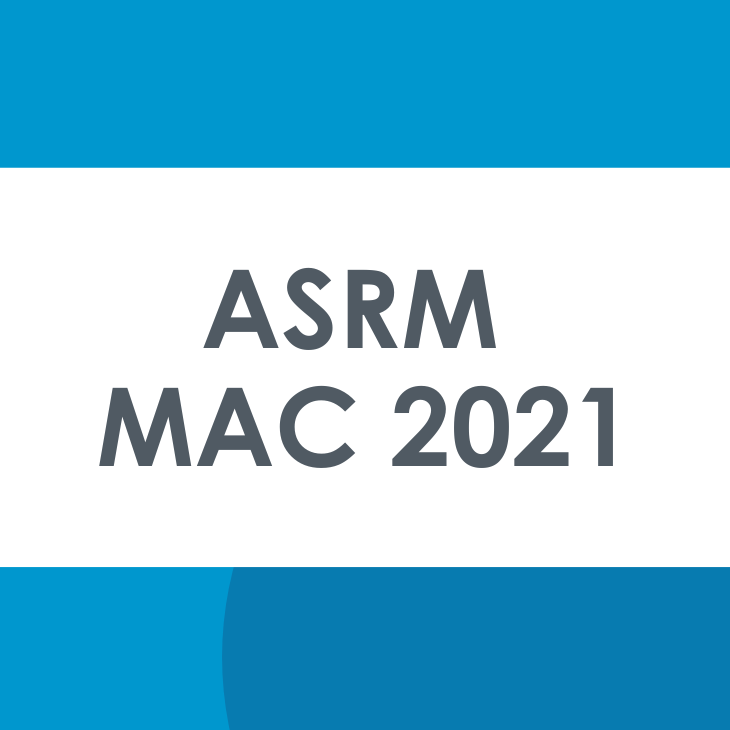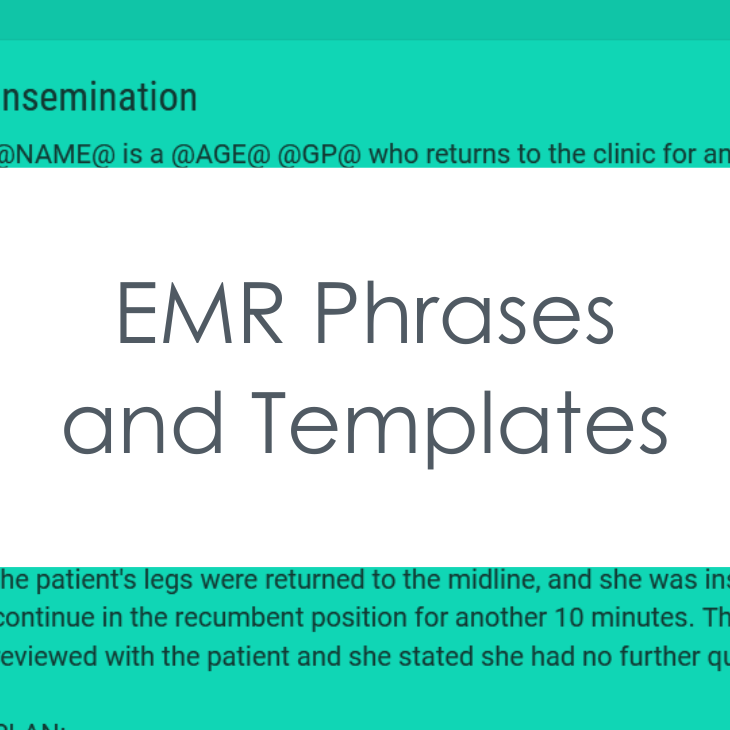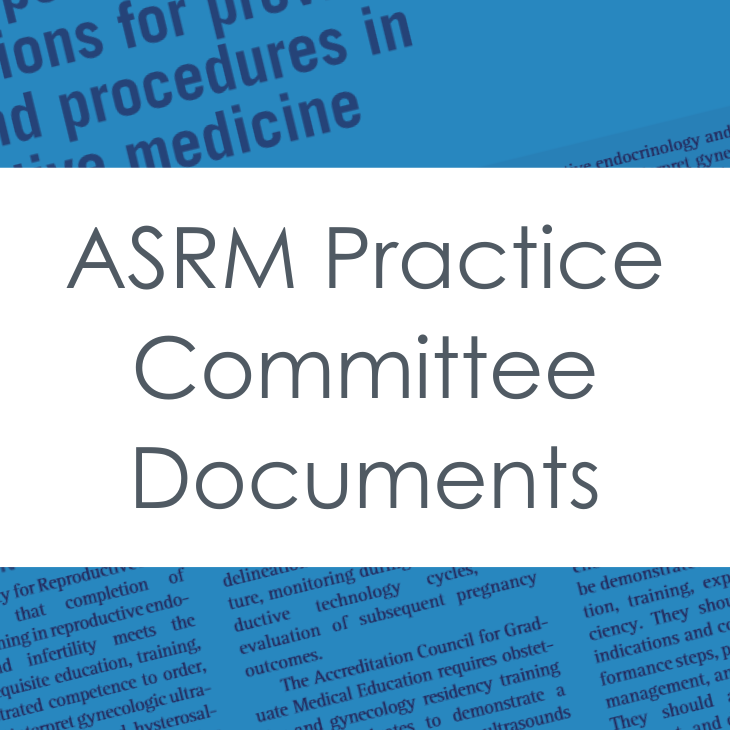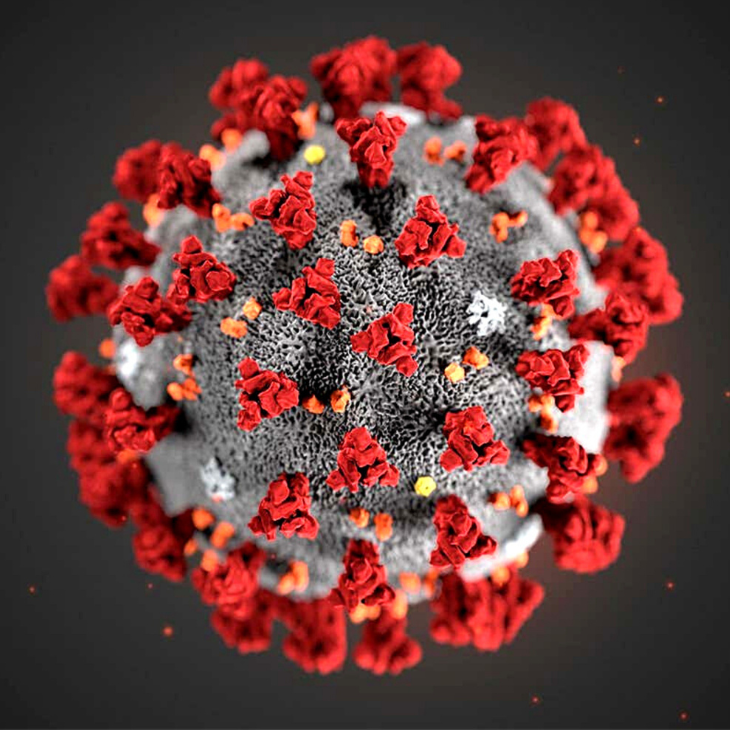Use of preimplantation genetic testing for monogenic defects (PGT-M) for adult-onset conditions: an Ethics Committee opinion (2018)
KEY POINTS
- Preimplantation genetic testing for monogenic disease (PGT-M) for adult-onset conditions is ethically justifiable when the conditions are serious and when there are no known interventions for the conditions, or the available interventions are either inadequately effective or are perceived to be significantly burdensome.
- For conditions that are less serious or of lower penetrance, PGT-M for adult-onset conditions is ethically acceptable as a matter of reproductive liberty.
- Physicians and patients should be aware that much remains unknown about the long-term effects of embryo biopsy on a developing fetus. Though thought to be without serious side effects, PGT-M for adult-onset diseases of less serious or of variable penetrance should be considered only after patients are carefully and thoroughly counseled to weigh the risks of what is unknown about the technology and the biopsy itself against the expected benefit of its use.
- It is important to involve the participation of a genetic counselor knowledgeable about such conditions before patients undertake PGT-M. Physician counseling should also address the patient-specific prognosis for achieving pregnancy and birth, if known, through in vitro fertilization (IVF) with PGT-M.
- If the IVF team is not comfortable transferring embryos that would result in offspring affected by the disease in question, they are not obligated to do so. In such cases, clinics should notify patients prior to starting treatment.
In both the United States and Europe, PGT-M for adult-onset conditions has been used with increasing frequency (1). Prenatal diagnosis and pregnancy termination have also been increasingly employed for serious single-gene diseases that are manifested principally in adulthood. In 2008, the Practice Committee of ASRM recommended PGT-M with IVF as a significant advance over post-conception diagnosis and pregnancy termination in the case of single-gene (monogenic) disorders (2). This opinion concludes that PGT-M is also ethically permissible in the case of genetically transmitted conditions that are highly serious and manifest in adulthood. Comprehensive counseling by a genetic counselor knowledgeable in the field of PGT-M prior to the start of the IVF process is critical to ensure that patients are adequately counseled before determining their course of action. Prenatal diagnostic testing via chorionic villus sampling (CVS) or amniocentesis to confirm the results obtained with PGTM, or as alternative to PGT-M, should also be discussed with couples as part of their pre-IVF genetic counseling.
PGT-M was initially developed to identify IVF embryos that carried genes for serious, childhood-onset diseases. More recently, PGT-M has been used for serious single-gene diseases that do not develop until adulthood, such as Huntington disease and early-onset Alzheimer disease; for cancer predisposition genes, such as BRCA mutations; and for nonfatal but potentially serious conditions that are apparent at birth, such as focal dermal hypoplasia (3–7). The use of PGT-M for these and other conditions is growing rapidly (1).
Huntington disease is an autosomal-dominant condition that is uniformly fatal, although the age of onset varies with the mutation. However, in the cases of some other serious adult-onset conditions for which PGT-M has been used, such as breast cancer associated with BRCA mutations, the presence of the identified gene or genes does not predict with certainty that an individual will ever develop the disease. Moreover, in many cases, disease can be treated successfully and thus may not be ultimately fatal, such as breast cancer (8). The use of PGT-M for serious adult-onset conditions thus raises challenging policy and ethical questions, given what we know about the human genome, disease etiology, and embryo biopsy procedures. The complexity of these issues demands that the patient considering the procedure consult with an expert in genetic counseling knowledgeable in the field of PGT-M (9).
To the best of current knowledge, embryo biopsy is not linked to fetal malformations or other identifiable problems in offspring (10–12). IVF itself is associated with an increased risk of multiple birth, particularly if more than one embryo is transferred. In addition, there is a small risk of ovarian hyperstimulation syndrome, potential complications associated with the oocyte retrieval, and an increased risk of adverse perinatal and obstetrical outcomes (5, 13). Thus, long-term consequences for the offspring as a result of IVF and PGT-M cannot be ruled out with certainty at present. Moreover, with the available PGT-M technology, testing is available only for identified single-gene mutations (or by linkage) causing disease. As of this time, testing is not available for multifactorial diseases, and there remain risks of diagnostic error and of missing unidentified mutations (2, 10).
ETHICAL ANALYSIS
Overview
Arguments offered in support of PGT-M for serious adult-onset conditions include the right to reproductive choice on the part of persons who seek to bear children, the medical good of preventing the transmission of genetic disorders, the avoidance of abortion based on the revelation of a genetic disorder through prenatal testing, and potential societal benefits of reducing the overall burden of disease. Arguments advanced against the use of PGT-M include expense, the questionable value of the medical benefits obtained in light of our inability to predict medical progress over the longer term, the possibility of misdiagnosis, the unknown risks of the procedure, and the possible negative impacts on persons living with the genetic disease or predisposition for the condition.
Arguments in Favor of PGT-M for Serious Adult-Onset Conditions
The goal of preventing serious disease supports the use of PGT-M for adult-onset conditions. PGT-M is an effective intervention to identify genes that can lead to disease (2). Parents may wish to try to avoid the possibility that their offspring will become afflicted with the condition of concern. There is also the potential benefit to society to avoid of the high costs of long-term treatment of severe chronic disease (14).In the case of adult-onset diseases, parents may have many reasons for choosing PGT-M. Reproductive liberty is an important, albeit not absolute, right. Parents may wish to avoid the lifelong concern caused by the chance that their children may develop serious adult-onset conditions. Professional organizations such as the American Academy of Pediatrics currently recommend that genetic testing of children for adult-onset conditions for which interventions are unavailable is inappropriate until children reach adulthood (15–17). This argument is based on the idea that the child has the right to an open future which is not burdened with the knowledge of a genetic condition. Families may thus experience the stress of not knowing about a possible adult-onset disease during childhood, until age 18. Critics have argued that this recommendation against testing fails to understand emerging autonomy and to appreciate the harms that may be associated with uncertainty (18), yet the recommendation was reaffirmed in 2013 (15).
Parents may also wish to avoid the stress of medical management during childhood. With some late-onset conditions, testing may be medically indicated before the child reaches adulthood. For patients who carry the familial polyposis gene (APC), for example, testing and polyp removal may be important before adulthood.
The use of PGT-M to avoid the transmission of a serious genetic disorder via discard of affected embryos can play a role in avoiding pregnancy termination based on the discovery of a genetic anomaly through prenatal testing. If individuals or couples use PGT-M to avoid giving birth to a child with the genetic marker for a serious adult-onset disorder, it is possible the patients would have aborted a fetus discovered to be affected during the pregnancy. While by no means universally held, some assert that discard of embryos via PGT-M is a more ethically acceptable choice than prenatal diagnosis followed by abortion (19).
Finally, cost reasons also support the reproductive liberty to choose PGT-M in cases of some adult-onset conditions. This is particularly relevant given the growing lifetime cost of health care for chronic medical conditions. With PGT-M, the expenses are borne at the outset; the costs of managing late-onset conditions may be significantly greater in comparison. Patients with a genetic condition must undergo repeated testing and treatment, often from early adulthood or beyond. The social costs of Huntington disease include lost wages and long-term medical treatment (20). The psychological impact of these diseases should also be considered, as many individuals who have these genes must live with the ongoing burden of fear and concern about the development of disease. An individual whose embryos are undergoing PGT-M for Huntington disease may also request that his or her own carrier status not be disclosed to him or her. It is ethically acceptable to honor such requests, but this practice is controversial around the world (21, 22).
If there are only affected embryos, it is permissible to transfer them after additional genetic counseling. If the IVF team is not comfortable transferring embryos that would result in offspring affected by the disease or predisposition in question, they are not obligated to do so (23). In such cases, clinics should alert patients to this fact prior to the start of treatment during initial PGT-M counseling.
Arguments Against PGT-M for Serious Adult-Onset Conditions
There are ethical reasons on the other side of the argument as well. The medical benefits of PGT-M for adult-onset conditions are speculative. It is impossible to predict whether effective treatment modalities will be available before the manifestation of identified conditions by the time the offspring reach adulthood. Individuals with the genetic trait may live healthy lives for several decades before a disease may become an active concern in adulthood. Moreover, some of these genes may have variable expressivity, manifesting as a much milder form of illness than anticipated, or perhaps not even expressing as illness at all, as in the case of some mutations that increase the lifetime risk of cancer. Cancer predisposition genes such as BRCA present a unique set of challenges. The current understanding of the complex interactions between DNA and the environment is limited. A woman who carries a BRCA1 gene has an increased risk for the development of breast and ovarian cancer but may never develop cancer for reasons that are not yet understood.Critics of PGT-M also argue that utilizing the procedure for embryo selection risks devaluing certain lives (24). They contend that PGT-M has the potential to send a negative message regarding the value of those individuals living with the disease, including those who have the mutation for the disease but have not yet developed physical manifestation of the syndrome (25). An additional criticism is that use of PGT-M may inaccurately assume that a gene leads to disease and thus inadvertently reinforce problematic views of genetic causation and responsibility. Moreover, PGT operates by preventing the birth of people with the disease, not by treating a disease in the parent. In addition, misdiagnosis remains a possibility for technical reasons, and the procedure is only available at present for conditions associated with a single gene, and not for multifactorial disorders (2, 10, 26, 27).
IVF with PGT-M also is an expensive procedure with no certainty of live birth. In addition, as mentioned previously, embryo transfer for IVF, with or without PGT-M, is associated with an increased risk of multiple pregnancy. However, other adverse obstetrical outcomes, with the exception of placenta previa, appear to be related to the underlying disease and not the process of PGT-M itself (28).
SUMMARY
After careful review and consideration, the Committee concludes, based on the arguments outlined above, that PGT-M for adult-onset conditions is ethically justified when the condition is serious and no safe, effective interventions are available. The Committee further concludes that reproductive liberty arguments ethically allow for PGT-M for adult-onset conditions of lesser severity or penetrance. In the latter cases, the application of the technology hinges on the evidence that PGT-M is a relatively low-risk procedure; this evidence may change. The complexity of the scientific, psychological, and social issues involved in this arena compels the Committee to strongly recommend that an experienced genetic counselor with knowledge about PGT-M play a major role in counseling patients considering such procedures.
Acknowledgments:
This report was developed by the Ethics Committee of the American Society for Reproductive Medicine as a service to its members and other practicing clinicians. While this document reflects the views of members of that Committee, it is not intended to be the only approved standard of practice or to dictate an exclusive course of treatment in all cases. This report was approved by the Ethics Committee of the American Society for Reproductive Medicine and the Board of Directors of the American Society for Reproductive Medicine.This document was reviewed by ASRM members and their input was considered in the preparation of the final document. The following members of the ASRM Ethics Committee participated in the development of this document. All Committee members disclosed commercial and financial relationships with manufacturers or distributors of goods or services used to treat patients. Members of the Committee who were found to have conflicts of interest based on the relationships disclosed did not participate in the discussion or development of this document.
Judith Daar, J.D.; Jean Benward, M.S.W.; Lee Collins, J.D.; Joseph Davis, D.O.; Owen Davis, M.D.; Leslie Francis, Ph.D., J.D.; Elena Gates, M.D.; Elizabeth Ginsburg, M.D.; Susan Gitlin, Ph.D.; Sigal Klipstein, M.D.; Laurence McCullough, Ph.D.; Richard Paulson, M.D.; Richard Reindollar, M.D.; Ginny Ryan, M.D.; Mark Sauer, M.D., M.S.; Sean Tipton, M.A.; Lynn Westphal, M.D.; Julianne Zweifel, Ph.D.
REFERENCES
- Chang J, Boulet SL, Jeng G, Flowers L, Kissin DM. Outcomes of in vitro fertilization with preimplantation genetic diagnosis: an analysis of the United States Assisted Reproductive Technology Surveillance Data, 2011-2012. Fertil Steril 2016;105:394–400.
- Practice Committee of the American Society for Reproductive Medicine. Preimplantation genetic testing: a practice committee opinion. Fertil Steril 2008;90:S136–44.
- BBC News. Embryos to be screened for squint. Available at: http://news.bbc.co.uk/2/hi/health/6634015.stm. Last accessed November 23, 2016.
- Wang C. Ethical, legal and social implications of prenatal and preimplantation genetic testing for cancer susceptibility. Reprod Biomed Online 2009;19(Suppl 2):23–33.
- Human Fertilisation & Embryology Authority (UK). Authority decision on PGT-M policy, 10 May 2006. Available at: http://www.hfea.gov.uk/hfea/rss/622.html. Last accessed November 23, 2016.
- Gigarel N, Frydman N, Burlet P, Kerbrat V, Tachdjian G, Fanchin R, et al. Preimplantation genetic diagnosis for autosomal recessive polycystic kidney disease. Reprod Biomed Online 2008;16:152–8.
- Bostwick B, Van den Veyver IB, Sutton VR. Focal dermal hypoplasia. In: Pagon RA, Adam MP, Ardinger HH, Wallace SE, Amemiya A, Bean LJH, et al., editors. GeneReviews® [Internet]. Seattle: University of Washington, Seattle; May 15, 2008:1993–2016 (updated July 21, 2016). Available at: http://www.ncbi.nlm.nih.gov/books/NBK1543/; May 15, 2008.
- Metcalfe K, Lynch HT, Foulkes WD, Tung N, Kim-Sing C, Olopade OI, et al. Effect of Oophorectomy on survival after breast cancer in BRCA1 and BRCA2 mutation carriers. JAMA Oncol 2015;1:306–13.
- Arpino G, Pensabene M, Condello C, Ruocco R, Cerillo I, Lauria R, et al. Tumor characteristics and prognosis in familial breast cancer. BMC Cancer 2016;16:924.
- De Rycke M, Belva F, Goossens V, Moutou C, SenGupta SB, Traeger- Synodinos J, et al. ESHRE PGT-M Consortium data collection XIII: cycles from January to December 2010 with pregnancy follow-up to October 2011. Hum Reprod 2015;30:1763–89.
- Desmyttere S, Bonduelle M, Nekkebroeck J, Roelants M, Liebaers I, De Schepper J. Growth and health outcome of 102 2-year-old children conceived after preimplantation genetic diagnosis or screening. Early Hum Dev 2009;85:755–9.
- Basille C, Frydman R, El Aly A, Hesters L, Fanchin R, Tachdjian G, et al. Preimplantation genetic diagnosis: state of the art. Eur J Obstet Gynecol Reprod Biol 2009;145:9–13.
- Pandey S, Shetty A, Hamilton M, Bhattacharya S, Maheshwari A. Obstetric and perinatal outcomes in singleton pregnancies resulting from IVF/ICSI: a systematic review and meta-analysis. Hum Reprod Update 2012;18:485–503.
- Chevreul K, Michel M, Brigham KB, López-Bastida J, Linertová R, Oliva-Moreno J, et al. Social/economic costs and health-related quality of life in patients with cystic fibrosis in Europe. Eur J Health Econ 2016;17(Suppl 1):7–18.
- American Academy of Pediatrics, Committee on Bioethics, Committee on Genetics, and American College of Medical Genetics and Genomics Social, Ethical and Legal Issues Committee Ethical and policy issues in genetic testing and screening of children. Pediatrics 2013;131:620–2.
- Kopelman L. Using the best interest standard to assess whether to test children for untreatable, late-onset genetic disease. J Med Philos 2007;32:375–94.
- New York State Task Force on Life and the Law. Genetic testing and screening in the age of genomic medicine. Available at: www.health.state.ny.us/nysdoh/taskfce/screening.htm. Last accessed February 26, 2013.
- Rhodes R. Genetic testing: is there a right not to know? MCN Am J Matern Child Nurs 2006;31:145.
- Cameron C, Williamson R. Is there an ethical difference between preimplantation genetic diagnosis and abortion? J Med Ethics 2003;29:90–2.
- Cavazza M, Kodra Y, Armeni P, De Santis M, López-Bastida J, Linertová R, et al. Social/economic costs and quality of life in patients with haemophilia in Europe. Eur J Health Econ 2016;17:53–65.
- Braude PR, De Wert GM, Evers-Kiebooms G, Pettigrew RA, Geraedts JP. Non-disclosure preimplantation genetic diagnosis for Huntington's disease: practical and ethical dilemmas. Prenat Diagn 1998;18:1422–6.
- Asscher E, Koops BJ. The right not to know and preimplantation genetic diagnosis for Huntington's disease. J Med Ethics 2010;36:30–3.
- Ethics Committee of the American Society for Reproductive Medicine. Transferring embryos with genetic anomalies detected in preimplantation testing: an Ethics Committee Opinion. Fertil Steril 2017;107:1130–5.
- Will GF. Golly, what did John do? Newsweek 2007;72.
- President’s Council on Bioethics, Eugenics and Inequality. Reproduction and responsibility: the regulation of new biotechnologies. Available at: http://bioethics.georgetown.edu/pcbe/reports/reproductionandresponsibility/chapter3.html. Last accessed August 15, 2017.
- Grace J, El-Toukhy T, Scriven P, Ogilvie C, Pickering S, Lashwood A, et al. Three hundred and thirty cycles of preimplantation genetic diagnosis for serious genetic disease: clinical considerations affecting outcome. BJOG 2006;113:1393–401.
- Fiorentino F, Biricik A, Nuccitelli A, De Palma R, Kahraman S, Iacobelli M, et al. Strategies and clinical outcome of 250 cycles of Preimplantation Genetic Diagnosis for single gene disorders. Hum Reprod 2005;21:670–84.
- Bay B, Ingerslev HJ, Lemmen JG, Degn B, Rasmussen IA, Kesmodel US. Preimplantation genetic diagnosis: a national multicenter obstetric and neonatal follow-up study. Fertil Steril 2016;106:1363–9.e1.
Topic Resources
View more on legal/ethical issues
Topic Resources
View more on the topic of genetic screening/testing
Ethics Opinions
Ethics Committee Reports are drafted by the members of the ASRM Ethics Committee on the tough ethical dilemmas of reproductive medicine.
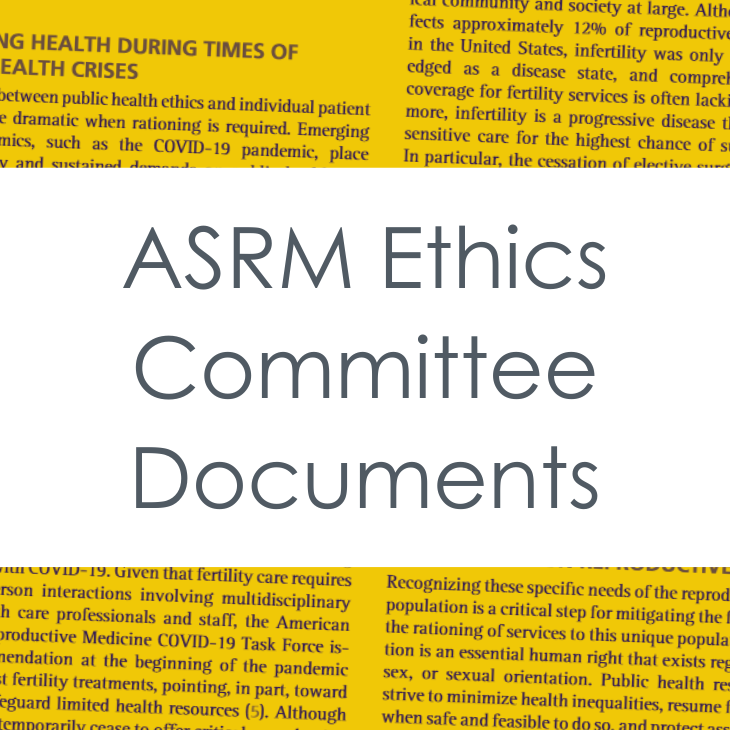
Family members as gamete donors or gestational carriers: an Ethics Committee opinion (2024)
The use of adult intrafamilial gamete donors and gestational surrogates is ethically acceptable when all participants are fully informed and counseled.
Financial ‘‘risk-sharing’’ or refund programs in assisted reproduction: an Ethics Committee opinion (2023)
Financial ‘‘risk-sharing’’ fee structures in programs charge patients a higher initial fee but provide reduced fees for subsequent cycles.
Planned oocyte cryopreservation to preserve future reproductive potential: an Ethics Committee opinion (2023)
Planned oocyte cryopreservation is an ethically permissible procedure that may help individuals avoid future infertility.

